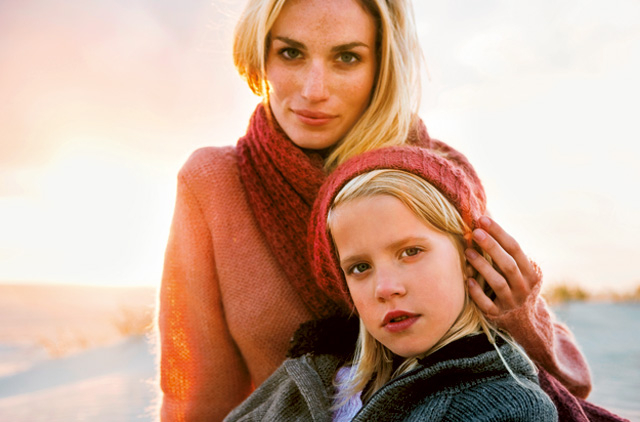YES
Louisa Wilkins, mother of two, aged six and three, and daughter of a chummy-mum
At last month's Billy Ocean gig, my mother was right beside me. As she was at Rod Stewart, Guns N' Roses, and Simon and Garfunkel, plus countless others. We holiday together; I took her to have her navel pierced; and she knows things about me that would make Jackie Collins blush. My mother is one of my best friends.
I understand that people will balk at that - they'll say that children have enough friends, that they need parents. But who says you can't be both? It's probably the same person who slams friendships between employers and employees, and teachers and students. OK, such ‘rules of engagement' might apply to these latter examples, but surely there's more to parenting than power?
Co-active life coach Evelyn Heffermehl d'Emilio (lighthousecoaching.ae) says, "People can confuse friendship with loss of authority, but that's a mistake - the real power in relationships comes from seeing others as individuals. Your child is a person in their own right."
My mother, Anna, concurs. She says, "Because I was a friend, rather than a disciplinarian, my children never had to lie to me, or keep secrets from me, which made parenting easier. I kept the lines of communication open by seeing the world through their eyes, without reproach."
The theory holds true. I feel safe to divulge because I know that my mother's interest comes from a place of love rather than judgement. Granted, we've had our disagreements, but there isn't a life event I couldn't share with her, and the sharing goes both ways. Heartbreak, depression, addiction - no subject is off limits, no detail deemed inappropriate. It's ‘Mothering Sans Frontieres'. The result? The rose-tinted mother-mantle fell away to reveal a living, breathing, fallible human being.
Perhaps this is the crux of the matter: fear of losing a child's idolisation. Or maybe parents think that in order to be a role model, they need to be squeaky clean. But isn't it better for a child to know that everyone slips up sometimes? Parenting manuals are full of advice on the power of apologising to your small child. In later years, these admissions of error can evolve from forgetting to buy chocolate sprinkles to more adult confessions. "This is the gift of vulnerability," says Evelyn. "Admitting our own regrets allows our children to be OK with their own mistakes and move forward." Psychoanalyst Donald Winnicott said that being a ‘good-enough mother' is far better for your child than being a ‘perfect' Bree Van der Kamp figure they can't live up to. I'm inclined to agree.
There is no right or wrong in this but, faced with the choice between the full disclosure route, or parenting with defined limits, I know which path I will choose to walk with my children. And it won't be the sugar-coated one.
NO
Kate Birch, mother of three, aged 14, 12 and six, and daughter of a mumsy-mum
Growing up in a functional household (unemotional and practical) as I did may seem a rather cold approach to parenting in today's mollycoddled society, but it had, and still has, its benefits. My mother and I were never friends but there was respect, discipline and guidance. The point is, I had lots of friends. I didn't need her to be my friend - I needed her to be my mum. And that's how I parent my kids. There have to be clear boundaries and divisions between parent and child.
Norma Cairns, counselling psychologist at Life Works Dubai (www.lifeworksdubai.com), agrees. "The role of the parent is to provide the child with a secure environment in which they can be loved, respected, supported, protected, supervised and disciplined, so they thrive and experience healthy attachments," she says. "Confiding in a child with regard to issues relating to the parent is wrong."
While Norma clearly isn't talking about listening to Billy Ocean (perish the thought) or wearing ‘sensible' cardigans draped over your shoulders (shudder), the child has to be shielded from ‘adult' decisions and issues to avoid guilt and also make it clear who is in charge. A problem shared may well be a problem halved with adult friends and family, but it doesn't work with kids. Neither is it appropriate to discuss feelings about friends and family that may colour a child's perceptions - especially when it comes to divorced parents.
"It is a very well-meaning trap that parents fall into," agrees Norma. "But it's ineffective because the child is not morally, emotionally or intellectually prepared to play that role. As kids grow older, the parents' role becomes more functional and less emotional, which is a hard lesson for parents who want to be their child's best friend."
I admit, I've sometimes found myself being too chummy with my daughter, but I try to keep a proper distance. Not only could it be suffocating for her but it's not appropriate for me. "Friends are a group of people with the same notion about life," says Norma. "But, kids and adults have very different ideas about what they should be doing."
My kids are more than capable of making their own decisions, but sometimes they have to make the wrong move to learn from it. "Limit-setting is a healthy function," says Norma. "It's how kids learn to figure out what's safe."
Thankfully, my childhood was blissfully ignorant of ‘adult issues'. But I have friends who were subjected to such confidences as a child. Not only did they grow up harbouring guilt and responsibility, but their opinions were coloured and moulded by supposedly caring parents.
I'm not saying you don't do ‘fun stuff' with your child, of course you do, but you recognise there's a distance: certain things (adult things) you don't discuss; certain things they do alone or with friends, rather than having mum trail along. Billy Ocean concerts excepted.









